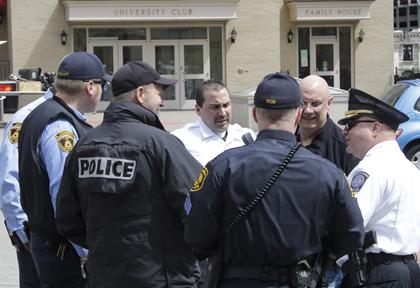A Contagion of Fear and An Education in Terrorism
“A contagion of fear has infected campus, and the successive, endless nature of bomb threat-related notifications and evacuations have amplified the hysteria, with the new security measures only lending credence to the fears…students are nevertheless looking over their shoulders, fleeing to their homes and dreaming about a Pittsburgh reenactment of the Virginia Tech shootings.”
Meet the new face of terrorism in America–the University of Pittsburgh!

[Update: 6 new threats overnight bring total to 63 threats!]
For those that have not been following the story, U Pitt has exploded (figuratively, luckily, and not literally) over the past week with bomb threats on the Pennsylvania campus, with a phenomenal 12 individual bomb threats on Monday along, bring the total this year to 57. Let me repeat that, just so it sinks in, 57 63 bomb threats at U Pitt since February. That amounts to nearly 1 bomb threat every single day of March and April!
After Monday’s latest incident the campus has effectively been put on lockdown, with full ID and backpack checks across campus, according to the campus paper The Pitt News. Originally the university had banned backpacks completely on campus, but apparently that turned out to be impossible (after all, how can you ban backpacks on a university campus where everyone virtually lives out of their backpacks). In addition, the university has called in the FBI, the Joint Terrorism Task Force and the Dept. of Justice. But not everyone is happy with the decisions that the university is taking to handle this matter. For instance, Pitt News columnist Matt Schaff wrote the following provocative comments in a piece titled Repeated evacuations, notifications cultivate fear:
“What if Pitt stopped evacuating buildings whenever it received bomb threats?
In the midst of such trying times, that question might turn stomachs, its idea striking as shortsighted, even callous. But we must acknowledge the danger of marrying ourselves to a single solution to this unprecedented problem. If our objective is to resurrect Pitt’s eroding learning environment, then we must instead commit to laying all options bare, to subjecting all ideas, whatever their emotional valence, to careful scrutiny and debate. Otherwise, we risk our educational institution perishing of self-inflicted wounds.
All I can do is note the danger in the direction Pitt has hitherto decided for itself. What our University has told the world in the past few weeks is that we will allow a series of empty threats to fill students with fear and turn our learning environment upside down, that we will let our educational values be held hostage by the whims of amateur terrorists armed merely — as far as we can tell — with laptops.“
It’s hard to imagine what is going through the minds of those involved in the bomb threats–or bomb hoaxes as seems increasingly likely–or for that matter if this is the work of one person or a group of people? Whatever the case, this is a perfect example of the dark side of modernity–a world where students learn to take bomb threats, backpack searches and terror threats as part of daily life–literally the normalization of terrorism as daily life. This also raises a more troubling problem, namely the copycat effect. Imagine what would happen if something like this were to occur on a much wider scale, say across a city like Pittsburgh or New York or Chicago? You can just imagine the public panic that would be set off if hundreds of schools or campuses had to be evacuated simultaneously under fears of possible attacks.
And while I am sympathetic to the critique that Schaff raises about the potential for the security state response to make things worse, there is no simply counter response either. All it will take is one ignored threat turned real with loss of life to make all of the arguments for restrained or minimally invasive practices effectively moot. And perhaps more worrisome, what if the person(s) behind the U Pitt incidents is waiting for number 75, which will be the real one, the one that doesn’t get called in…
Until next time…welcome to the future of higher education.
###


